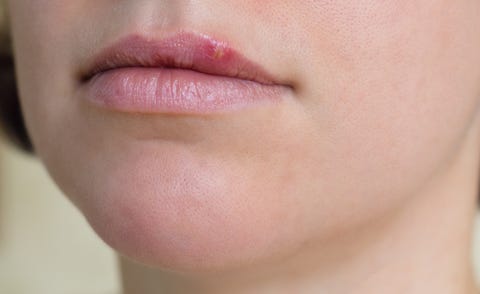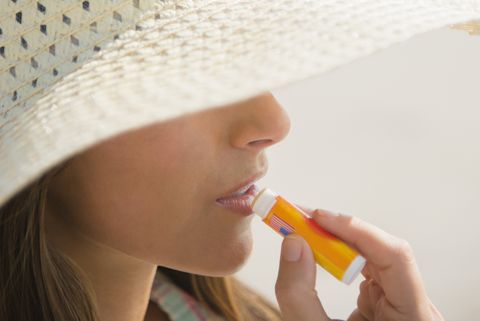For most of us, dry and irritated lips are just another nuisance that colder weather hurls our way—but if you’re one of the 50 percent of Americans under 50 years old carrying the herpes simplex 1 virus (HSV-1), you know that burning, tingling sensation near the edge of your lip all too well: a cold sore brewing beneath the surface.
HSV-1 is usually transmitted through direct skin-on-skin contact when a lesion is present, explains Graham King, MD, a family medicine physician with the Mayo Clinic Health System. Although there are two types of herpes viruses, it’s usually HSV-1 that leads to cold sores.
“HSV-1 is more frequently associated with oral breakouts, and herpes simplex 2 with genital infections, although either type can affect either area,” says Robert Anolik, MD, board-certified dermatologist at the Laser and Skin Surgery Center of New York.
Here’s how it happens: You can contract HSV-1 even when a person has no visible blisters. Once you’re infected, the virus sits dormant in your nerve cells until something triggers a breakout. The virus is impossible to eradicate from your body, but cold sores usually occur when the virus is reactivated.
You’ll usually feel a cold sore coming on a day or two before it develops. “The herpes virus tends to fester under your skin and during times that your immune system takes a hit. The most common symptoms include tingling, itching, or burning sensations even before the blisters or sores can be seen,” says Michael Kassardjian, DO, board-certified dermatologist at Coast Dermatology.
The most annoying part? Cold sores can last anywhere from a few days to a couple of weeks after being triggered. Luckily, there are measures you can take to shorten the amount of time it lasts. Here’s how to get rid of your cold sore ASAP—and how to prevent it from coming back.
How to get rid of a cold sore
“Cool compresses or ice can be applied 5 to 10 minutes a few times a day to also help relieve some of the discomfort and decrease inflammation,” says Dr. Kassardjian.
Avoid the urge to pick at it, too. Touching a cold sore not only dries it out, but can set you up for a bacterial infection, says Mona Gohara, MD, assistant clinical dermatology professor at Yale University, since anything on your hands can make its way into the broken skin.
Use a topical OTC antiviral medication
Stay away from acidic foods
“When outbreaks happen, stay away from acidic foods such as oranges and tomato-based foods,” says Dr. Anolik. The acid can irritate your cold sores and prevent them from scabbing, making them last longer.
Create a protective barrier
“Apply a topical barrier cream such as Vaseline,” says Dr. King. This will help limit exposure to wind or cold air, which are known cold sore triggers.
Get a prescription-strength antiviral medication
If OTC treatments aren’t cutting it, ask your derm about trying a prescription-strength remedies, which range from topical creams and ointments to oral medication, says Dr. Kassardjian.
Those who deal with cold sores frequently can also try suppression therapy, which involves a daily dose of medication (typically around 500 milligrams) to prevent future breakouts, says Dr. Anolik. “Valacyclovir (an oral medication) is the most effective prescription treatment in otherwise healthy people,” he adds. “That dosing halts a lot of the process and shortens the duration of the cold sore outbreak. It works by preventing the herpes virus from being able to multiply.”
How to prevent cold sores
If your partner has a cold sore, hold off on the lip lock. Because cold sores spread through contact with someone who who has the virus, you should also avoid sharing eating utensils and glasses.
If you love lipstick, balms, liner, and gloss, it might pain you to read this: Throw them out if you used them right before your cold sore popped up, since they were likely contaminated with the virus. Give your pillowcase a wash while you’re at it.
Protect your lips with SPF
Sunburns not only trigger cold sores by weakening your immune system—but they can make the ones you already have so much worse, says Dr. Kassardjian. So in addition to slathering your face with sunscreen, do the same with your lips. Go for a lip balm that contains zinc oxide and of SPF 30 or higher, he recommends.
Just be careful with your application: If you already have a visible sore, apply lip balm to the affected area separately with a cotton swab to minimize the risk of it spreading, suggests Dr. Gahara.
When it comes to cosmetic procedures, that is. “If you have a history of having cold sores, it is very important to let your provider know before any cosmetic or surgical procedures, such as chemical peels and lasers,” says Dr. Kassardjian. “Resurfacing procedures can make the virus spread like wildfire on your face, so a course of oral antivirals prior to any such treatments may be necessary.”
Keep your immune system in good shape
In general, improve and maintaining a healthy immune system will work wonders. “Limit stress, eat a healthy diet, and try to get adequate sleep and exercise,” says Dr. Kassardjian. “All of these factors may contribute to knocking down your healthy immune response, so try to get it back on track to fight off the virus and keep it dormant.”
























